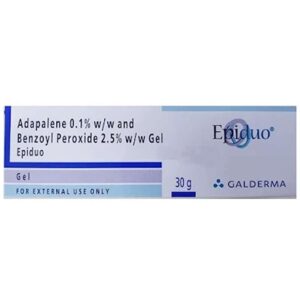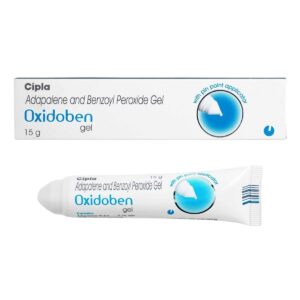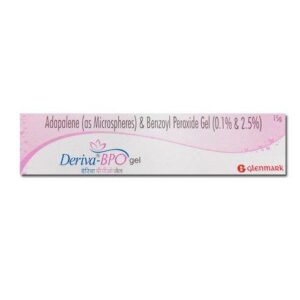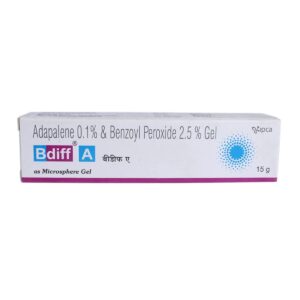ADAPALENE + BENZOYL PEROXIDE
Adapalene: Adapalene is a medication commonly used to treat acne vulgaris. It belongs to the class of drugs known as retinoids, which are derivatives of Vitamin A. Adapalene is available as a gel, cream, or lotion and is usually applied topically to the affected areas of the skin.
The exact mechanism of action of Adapalene is not fully understood. However, it is thought to work by normalizing the differentiation of follicular epithelial cells, decreasing inflammation, and reducing the formation of microcomedones, which are the precursor to acne lesions.
The usual recommended dose of Adapalene is to apply a thin layer to the affected area once daily, preferably in the evening, after washing the face gently with a mild cleanser and allowing the skin to dry. It is important to avoid applying the medication to open wounds, irritated or eczematous skin, as it may cause further irritation. Adapalene should not be ingested or applied near the mouth, eyes, or broken skin.
Like any medication, Adapalene may cause side effects. The most common side effects include dryness, redness, itching, or scaling of the skin at the application site. These effects are usually mild and resolve on their own over time. However, if these side effects persist or worsen, it is important to consult a healthcare professional. In some cases, Adapalene may cause skin irritation, burning, stinging, or peeling.
Rarely, severe allergic reactions may occur, characterized by hives, difficulty breathing, swelling of the face, lips, tongue, or throat. If any of these symptoms occur, immediate medical attention should be sought.
It is important to note that Adapalene can increase the skin’s sensitivity to sunlight, so it is recommended to avoid excessive sun exposure or use sunscreen and protective clothing while using this medication. Additionally, it may take several weeks of consistent use before seeing significant improvement in acne symptoms.
Overall, Adapalene is an effective treatment option for acne vulgaris when used as directed and under the supervision of a healthcare professional. It is important to follow the recommended dose and instructions for use and to discuss any concerns or questions with a healthcare provider.
Benzoyl Peroxide: Benzoyl Peroxide is a medication commonly used for the treatment of acne. It belongs to a class of drugs called keratolytics, which work by reducing the amount of acne-causing bacteria on the skin and helping to unclog pores.
The primary use of Benzoyl Peroxide is to treat mild to moderate acne. It is available in various forms, including gels, creams, lotions, and washes. The medication is typically applied directly to the affected areas of the skin once or twice daily.
The mechanism of action of Benzoyl Peroxide involves its ability to penetrate the hair follicles and sebaceous glands, where it releases oxygen and kills the bacteria responsible for acne. Additionally, it acts as a drying agent, helping to reduce excess oil production and promoting the shedding of dead skin cells.
The recommended dose of Benzoyl Peroxide may vary depending on the severity of the acne and the formulation being used. It is important to follow the instructions provided by the healthcare provider or indicated on the product packaging.
Common side effects of Benzoyl Peroxide include skin dryness, redness, peeling, itching, and a mild stinging or burning sensation upon application. These side effects are typically temporary and may improve as the skin adjusts to the medication. If the side effects are severe or persistent, it is advisable to consult a healthcare professional.
Some individuals may be sensitive or allergic to Benzoyl Peroxide, and it may cause more serious side effects, such as severe skin irritation, swelling, or difficulty breathing. If any of these symptoms occur, medical attention should be sought immediately.
Benzoyl Peroxide can also cause bleaching or discoloration of hair, clothing, and bedding. It is advisable to use white towels and pillowcases and avoid contact with colored fabrics.
It is important to note that Benzoyl Peroxide may increase the skin’s sensitivity to sunlight, therefore, it is recommended to use sunscreen and limit sun exposure while using this medication.





